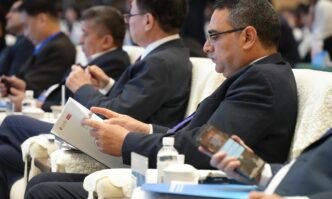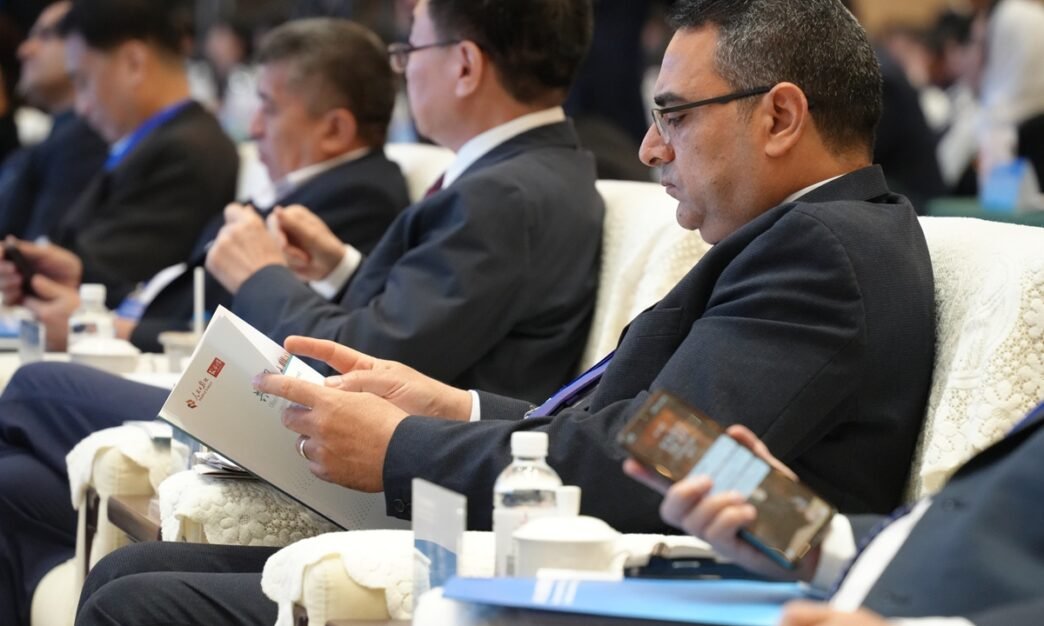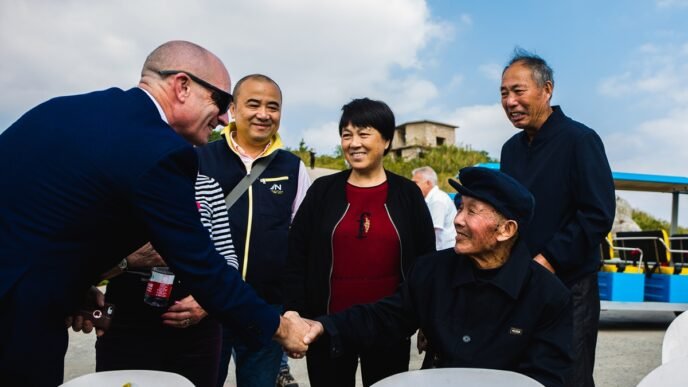This year is SCO’s “China Year.” On May 23, at the opening ceremony of the 2025 Media Cooperation Forum of Shanghai Cooperation Organization (SCO) Countries held in Urumqi, capital city of Northwest China’s Xinjiang Uygur Autonomous Region, the International News Department of the People’s Daily and the Global Times Institute jointly released a report titled “Common Home: Public Opinion on the Development Visions in SCO Member States.”
The survey was conducted among the general public aged 18-60 in 10 full member states of the SCO, and a total of 5,719 valid questionnaires were collected in 11 languages, including Chinese, English, Russian, Persian, Urdu, and Kazakh.
According to the findings, over 80 percent of respondents believe the SCO plays a positive role in global governance, providing member states with enhanced international cooperation, increased development opportunities, access to advanced technologies, and more development experience. An overwhelming 95 percent of those surveyed agreed that partnering with China brings tangible benefits to their countries. Meanwhile, more than 90 percent of respondents expressed hope for deeper collaboration among SCO members in key areas such as the economy, technology, security, and people-to-people exchanges.
The findings offer a robust gauge of public opinion, reinforcing the push for a closer-knit SCO community with a shared future. Against the backdrop of global instability, the strong public endorsement of multilateral cooperation among SCO countries stands out as particularly significant.
Guests at the 2025 Media Cooperation Forum of Shanghai Cooperation Organization Countries read the report “Common Home: Public Opinion on the Development Visions in SCO Member States,” on May 23, 2025. Photo: Courtesy of Zhang Kaifeng
‘Shanghai Spirit’ yields fruitful results
Over the 24 years since its establishment, the SCO has expanded from 6 members to a big family involving 26 countries, with its influence, cohesion, and appeal continuously increasing. The “Shanghai Spirit,” which features mutual trust, mutual benefit, equality, consultation, respect for diverse civilizations, and pursuit of common development, is the set of values that underpins the SCO and the wellspring of its enduring growth and expansion. Survey data shows broad public support for these values among the citizens of SCO member states.
The SCO is playing an increasingly significant role in promoting and consolidating comprehensive peace, security, and stability, as well as in building a democratic and just new international political and economic order. More than 80 percent of respondents recognized the SCO’s positive role in global governance. Among these, its role in maintaining global security garnered the highest rate of approval, followed by promoting global development, and advancing economic globalization.
The organization also received high recognition for establishing a more just and equitable new international order and facilitating exchanges and mutual learning among civilizations.
Over the past 24 years, the SCO has provided vast space and strong support for the development of its member states, bringing tangible benefits to the peoples of regional countries, and serving as a vital platform for member states to enhance their international influence and achieve development and progress. Overall, nearly 70 percent of respondents agreed that their countries have gained more opportunities to participate in global governance through the SCO framework. In China, Tajikistan, and India, the approval rates approach or exceed 80 percent.
Over 60 percent of respondents agreed that the SCO has contributed to their countries’ sustainable development and modernization. China had the highest proportion of respondents in agreement, exceeding 80 percent.
More than 80 percent of respondents recognized that development cooperation within the SCO framework has brought tangible benefits to their countries, with high approval for options such as “enhanced international cooperation,” “increased development opportunities,” “access to advanced technology,” and “more development experience.”
“The SCO has achieved multiple landmark accomplishments in global governance, security, and development. In security cooperation, the SCO has continuously deepened collaboration on counter-terrorism, non-proliferation, and cybersecurity, enhancing its capacity to jointly combat the ‘three evil forces’ of terrorism, extremism, and separatism,” Yang Jin, an associate research fellow with the Institute of Russian, Eastern European and Central Asian Studies at the Chinese Academy of Social Sciences, told the Global Times.
In terms of development cooperation, Yang pointed out that 2025 has been designated as the SCO Year of Sustainable Development, with member states focusing on poverty alleviation, digital economy, and green development. “In global governance, the SCO is committed to building a multipolar and democratic international order,” he said.
Deng Hao, former Secret-General of the China SCO Research Center and specially-appointed professor at the Xinjiang Normal University, told the Global Times, “Through 24 years of relentless exploration, the SCO has found a new path for cooperation that differs from the Cold War era. This path aligns with the trends of the times, fits the regional realities, and serves the fundamental interests of the member states.”
North China’s Tianjin Municipality set to host 2025 SCO summit Photo: VCG
Positive impact from cooperation with China
As a founding member, China continuously injects momentum into the development of the SCO through institutional innovation and experience sharing. Ninety-five percent of respondents believe that China’s development experience is worth learning from. The proportion is higher in Tajikistan, Russia, India, and Kazakhstan compared to other member states.
Xu Tao, deputy director of the Eurasian Institute of Social Development at the Development Research Center of the State Council, told the Global Times, “Most SCO member states are at a critical historical stage of development transformation. They need to achieve development goals in areas such as economic model conversion, social governance innovation, and national cultural reconstruction as soon as possible. In recent years, China has launched practical cooperation platforms like ‘SCO plus’ and sincerely shared Chinese wisdom, experience, and technological innovation models with member states.”
Yang told the Global Times that “China’s development provides various opportunities for SCO member states. Economically, the joint construction of the Belt and Road Initiative (BRI) promotes regional connectivity and trade facilitation, offering examples for member states in infrastructure construction such as high-speed railways, highways, and ports. In terms of technology, experiences in agricultural modernization, agricultural product processing, and agricultural science and technology can help improve agricultural production efficiency in member states. The rapid development in fields like artificial intelligence, 5G communication, and big data offers cooperation opportunities for member states. Socially, China’s poverty alleviation experience and social governance model provide valuable references for member countries.”
The survey results indicate that 95 percent of respondents believe that cooperation with China can positively impact their countries. Among the specific areas listed, facilitating trade and economic cooperation received the highest recognition at 43 percent. This was followed by enhancing agricultural technology, advancing high-tech sectors, improving infrastructure development, and supporting rural poverty reduction.
Chen Yurong, the first Secret-General of the China SCO Research Center and a research fellow at the China Institute of International Studies, told the Global Times that the operation of the China-Europe Railway Express and the China-Kyrgyzstan-Uzbekistan railway has significantly boosted the economic development of the countries along these routes, providing numerous conveniences and benefits to local populations. In recent years, the establishment of the China-SCO Local Economic and Trade Cooperation Demonstration Area (SCODA), and the SCO Demonstration Base for Agricultural Technology Exchange and Training in Yangling, Northwest China’s Shaanxi Province, have become “new models” for promoting regional economic cooperation and governance.
When asked which aspects of China they were interested in most, respondents showed a relatively high preference for “Made-in-China products,” “smartphones,” “the Great Wall,” “high-speed rail,” and “new energy vehicles.” Overall, 90 percent of respondents expressed a willingness to visit China in the future, with over 70 percent choosing “traveling,” a significantly higher proportion than other options.
A participant competes in the?third SCO Countries Worker Skills Contest?in Qingdao, East China’s Shandong Province, on December 18, 2024. Photo: VCG
Highly anticipated fields in cooperation
More than 70 percent of respondents hold positive expectations regarding the SCO’s contributions to regional and even global development and cooperation in the future.
Regarding economic development cooperation under the SCO framework, 93 percent of respondents expressed anticipation. Among the various forms of cooperation, “trade/investment” was the most anticipated, particularly favored by respondents from Russia, Kazakhstan, Belarus, and India. Following this, “poverty reduction” received the highest expectations in Iran and Pakistan. Additionally, cooperation in “energy,” “AI,” “agriculture,” the “digital economy,” and “new energy vehicles” is also highly anticipated. Over 70 percent of respondents support the SCO’s initiative to promote “local currency payments and settlements among SCO member states.”
Moreover, 92 percent of respondents expressed anticipation for future technological cooperation under the SCO framework. Specifically, the most anticipated areas of collaboration include “5G/communication technology,” “new energy,” “agricultural technology,” and “AI/big data.”
More specifically, the Indian respondents placed greater emphasis on “5G/communication technology,” while “new energy” cooperation was most anticipated in Russia. In Iran, the highest interest was in “AI/big data,” whereas citizens of Kazakhstan and Tajikistan prioritized “agricultural technology.”
More than 90 percent of respondents also expressed anticipation for security cooperation within the SCO. Specifically, “combating drug trafficking” garnered the highest anticipatory feedback, particularly ranking first among respondents in Kazakhstan and Russia. This was followed by “joint actions against terrorism, separatism, and extremism,” “combating human trafficking,” and “data security.” Indian respondents showed the strongest expectation for “data security” cooperation, while over half of respondents in Russia and Kazakhstan looked forward to enhanced cooperation in “resolving international/regional hotspot issues through consultation.”
When asked whether they expected the SCO to play a more significant role in resolving regional security issues through consultation, over 70 percent of respondents expressed anticipation. Chinese respondents had the highest expectation rate at 88 percent, followed by approximately 80 percent in Iran, India, and Tajikistan, with Kazakhstan, Pakistan, and Russia all exceeding 70 percent.
Cultural and people-to-people exchanges is one of the important pillars of the SCO. Ninety-three percent of respondents expressed anticipation for future cultural and people-to-people exchange activities within the organization. Among these, “youth exchanges,” “vocational training,” “university/student exchanges,” “foreign language learning,” “tourism festivals,” and “cultural/art festivals” received relatively high anticipatory feedback. Tajikistani respondents showed particular interest in “foreign language learning,” India favored hosting “tourism festivals” and “youth exchanges,” while Kazakhstan placed greater emphasis on “vocational training.”
Among all member states, China was the most desired travel destination for respondents, with 65 percent expressing interest, followed by Russia at 55 percent. Notably, over three-quarters of respondents in Kazakhstan and Pakistan wished to visit China, while about 70 percent of Russian respondents expressed the same desire.
Xu told the Global Times that “In the future, building on existing initiatives such as the SCO University, youth exchange camps, and children’s art exhibitions, we could consider the necessity and feasibility of establishing an SCO cultural and tourism cooperative alliance. This would create a platform for policy coordination, resource sharing, and business collaboration among member states’ cultural and tourism departments and enterprises, promoting economic development via tourism, while facilitating mutual understanding of diverse cultures and civilizational exchanges among peoples.”
Deng told the Global Times, “Currently, the expectations and hopes of SCO member states are stronger and more urgent than ever. An increasing number of countries are looking to the SCO to maintain regional stability and achieve national economic revitalization. They hope that all member states will unite sincerely, strengthen cooperation, overcome difficulties together, and ultimately achieve win-win cooperation and common development.”













